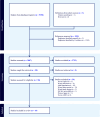A scoping review on peer-led interventions to improve youth mental health in low- and middle-income countries
- PMID: 39781336
- PMCID: PMC11704389
- DOI: 10.1017/gmh.2024.149
A scoping review on peer-led interventions to improve youth mental health in low- and middle-income countries
Abstract
Youth living in low- and middle-income countries (LMICs) have an increased vulnerability to mental illnesses, with many lacking access to adequate treatment. There has been a growing body of interventions using task sharing with trained peer leaders to address this mental health gap. This scoping review examines the characteristics, effectiveness, components of peer delivery and challenges of peer-led mental health interventions for youth aged 10-24 in LMICs. A key term search strategy was employed across MEDLINE, Embase, Web of Science, Global Health and Global Index Medicus. Eligibility criteria included young people aged 10-24 and a peer-led component delivered in any setting in an LMIC. Study selection and extraction were conducted independently by the first and second authors, with discrepancies resolved by the senior author. Study characteristics were summarised and presented descriptively. The search identified 5,358 citations, and 19 studies were included. There were 14 quantitative, four qualitative and one mixed methods study reporting mental health outcomes. Types of interventions were heterogenous but fell within three broad categories: (1) peer education and psychoeducation, (2) peer-led psychotherapy and counselling and (3) peer support. All studies reported improved mental health outcomes as a result of the peer-led interventions. Peer-led interventions are versatile in terms of both the types of interventions and mode of delivery. Lived experience, mutual respect and reduced stigma make this method a highly unique and effective way to engage this age group. However, implementing peer-led youth interventions is not without challenges. Adequate training, supervision, cultural appropriateness and support from established institutions are critical to safeguarding and ensuring the sustainability of such programs. Our findings suggest that peer-led models are a valuable intervention strategy that policymakers can leverage in current and future efforts to address youth mental health in LMICs. Future areas of research should expand to include the perspectives of other key stakeholders involved in the implementation of peer-led mental health interventions, focusing on factors including fidelity, feasibility and acceptability to enhance implementation insights.
Keywords: low- and middle-income countries; mental Health; peer-led interventions; task-sharing.
© The Author(s) 2024.
Conflict of interest statement
The authors declare that the research was conducted in the absence of any commercial or financial relationships that could be construed as a potential conflict of interest.
References
-
- Arndt N and Naudé L (2020) Responsibility in the face of adversity: Adolescents’ sense of self in reciprocal relationships. Youth & Society 52(2), 288–307.
-
- Atif N (2015) The acceptability of peer volunteers as delivery agents of a psychosocial intervention for perinatal depression in rural Pakistan: A qualitative study. The University of Manchester (United Kingdom).
Publication types
Grants and funding
LinkOut - more resources
Full Text Sources
Miscellaneous

